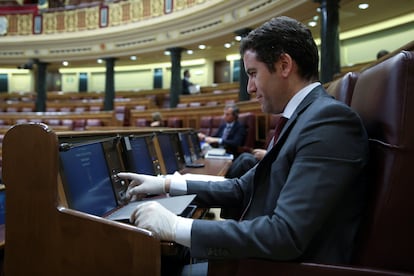Opposition Popular Party backs stricter lockdown, but slams government “improvisation”
Spain’s biggest labor unions also support the move, but businesses warn of “negative impact” on companies

The main opposition Popular Party (PP) said yesterday that it supported the measures announced by the central government to suspend all non-essential activity in Spain, in a bid to slow the spread of the coronavirus and decongest overwhelmed intensive care units (ICUs). But the party’s general secretary, Teodoro García Egea, also criticized Prime Minister Pedro Sánchez for what he described as “continuous improvisation” during the crisis.
“This crisis is moving faster than the government,” he said. “They are not up to the task.”
The Popular Party called on Sánchez to suspend taxes for Spanish citizens while the country is on total lockdown, and to exempt self-employed workers from paying their monthly social security contributions
On Saturday the Health Ministry announced that a total of 5,704 people had died so far in Spain as a result of the global coronavirus pandemic, with 72,248 infections detected. More than 40,600 coronavirus patients are currently hospitalized, while 12,285 have recovered from the Covid-19 disease and have been discharged from hospital. A total of 4,575 patients are currently in the ICUs of Spanish hospitals.
García Egea also called on Sánchez to suspend taxes for Spanish citizens while the country is on total lockdown, and to exempt self-employed workers from paying their monthly social security contributions.
The president of center-right party Ciudadanos (Citizens), Inés Arrimadas, also criticized the actions of Sánchez. “Many Spaniards see the strengthening of measures to guarantee social distancing as necessary,” she wrote via Twitter last night. “But the government cannot generate more uncertainty. Sánchez should be clear about his decisions and give guarantees and convey calm to workers, the self-employed and companies. Today he didn’t do that.”
Earlier this week, the majority of parties in Spain’s lower house of parliament, the Congress of Deputies, voted in favor of extending the state of alarm from the initial two weeks to a month. The initial lockdown is due to last until April 12. The new measures that are due to be approved by the Cabinet today, however, and will see all non-essential workers confined to their homes, will go into place on Monday March 30 and will last until Thursday April 9. Friday April 10 is a national holiday in Spain for Easter week.
The majority of Spain’s political parties also expressed their support this week for tougher confinement measures in a bid to slow the spread of the Covid-19 disease. PP leader Pablo Casado said that he would prefer to “err on the side of caution” in the battle against the epidemic. Although during the debate in Congress this week on extending the state of alarm, he did not present any amendments to the government’s plan to demand new measures.
Labor union response
Spain’s two main labor unions also responded on Saturday to the government’s stricter lockdown measures, saying that they supported the move. Business sources, meanwhile, warned that “the measure will generate an unprecedented huge impact on the Spanish economy, particularly in sectors such as industry.”

“The important thing is to follow the recommendations of the experts, that’s why we support the measure,” said the leader of the UGT union, Pepe Álvarez. “The priority is to deal with the health emergency. If activity needs to be restricted further to do this, we support this,” added the general secretary of the CCOO union, Unai Sordo.
Sources from the business sector stated that “if the health authorities understand that we must stop, there is no other option but to do so, because the most important thing is health and to fight the pandemic.”
The same sources added, however, that the “total stop is not good news because it is going to have a very negative impact on the economies of companies.” Business chiefs underlined that once industry stops entirely, it is very difficult to get back up to speed once more.
English version by Simon Hunter.
Tu suscripción se está usando en otro dispositivo
¿Quieres añadir otro usuario a tu suscripción?
Si continúas leyendo en este dispositivo, no se podrá leer en el otro.
FlechaTu suscripción se está usando en otro dispositivo y solo puedes acceder a EL PAÍS desde un dispositivo a la vez.
Si quieres compartir tu cuenta, cambia tu suscripción a la modalidad Premium, así podrás añadir otro usuario. Cada uno accederá con su propia cuenta de email, lo que os permitirá personalizar vuestra experiencia en EL PAÍS.
¿Tienes una suscripción de empresa? Accede aquí para contratar más cuentas.
En el caso de no saber quién está usando tu cuenta, te recomendamos cambiar tu contraseña aquí.
Si decides continuar compartiendo tu cuenta, este mensaje se mostrará en tu dispositivo y en el de la otra persona que está usando tu cuenta de forma indefinida, afectando a tu experiencia de lectura. Puedes consultar aquí los términos y condiciones de la suscripción digital.








































